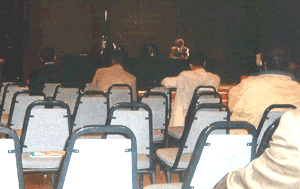Deputy Prime Minister Addisu Legesse draws protesters
 Seattle Post-Intelligencer
Seattle Post-Intelligencer
2005 elections remain an issue
Ethiopia's deputy prime minister came to Seattle Thursday to meet with members of the city's Ethiopian community and drew about 60 expatriate protesters who decried his government's killing of activists last year during a controversial election.
Deputy Prime Minister Addisu Legesse met with Ethiopian immigrants at The Mountaineers headquarters at 300 Third Ave. W. Seattle police and federal officials heavily guarded the building, with about a dozen officers positioned outside the building facing flag-waving and chanting activists.
Muluneh Yohannes, 28, one of several protest organizers, said he and fellow immigrants were trying to bring attention to Ethiopia's political situation. Last year, scores of Ethiopians were killed when they took to the streets to challenge the results of national elections.
Yohannes, who said he sought political asylum three years ago in the U.S., said they also were calling for the release of political prisoners jailed during last year's post-election strife. Many Ethiopians living in Seattle protested en masse last year, too.
"The only thing we can do is show our concern democratically for our people. These killers should face justice," Yohannes said. 
Ethiopia's prime minister, Meles Zenawi, was re-elected to a third term last year in parliamentary elections that his opponents and some independent observers allege were rigged.
Zenawi first came to office in the early 1990s and installed a system of federalism after toppling a socialist dictator who ruled Ethiopia, one of the world's poorest countries, for nearly 20 years.
Legesse, the deputy prime minister, and a few other Ethiopian officials, met with about 40 expatriates to speak about economic development projects and the election process in their native country.
An official with the Ethiopian consulate said Legesse's trip was for a few days but declined to comment on the protests.
One attendee, MeKonnen Kassa, 42, who emigrated to Seattle 18 years ago, said that he felt that Ethiopia was unstable and he agreed that it was wrong for people to die. But, he said, he felt Thursday's activists were stifling democracy by intimidating Ethiopians who wanted to hear from the government.
"As long as they behave, they can come in and challenge this guy," he said. "The government made a huge mistake, but we want to listen to the government's side of the story."
Police made no arrests, although one man claimed he was pushed and his camera damaged.
P-I reporter Scott Gutierrez can be reached at 206-448-8334 or
scottgutierrez@seattlepi.com.
***Pictures courtesy of www.ethiomedia.com
 Seattle Post-Intelligencer
Seattle Post-Intelligencer2005 elections remain an issue
Ethiopia's deputy prime minister came to Seattle Thursday to meet with members of the city's Ethiopian community and drew about 60 expatriate protesters who decried his government's killing of activists last year during a controversial election.
Deputy Prime Minister Addisu Legesse met with Ethiopian immigrants at The Mountaineers headquarters at 300 Third Ave. W. Seattle police and federal officials heavily guarded the building, with about a dozen officers positioned outside the building facing flag-waving and chanting activists.
Muluneh Yohannes, 28, one of several protest organizers, said he and fellow immigrants were trying to bring attention to Ethiopia's political situation. Last year, scores of Ethiopians were killed when they took to the streets to challenge the results of national elections.
Yohannes, who said he sought political asylum three years ago in the U.S., said they also were calling for the release of political prisoners jailed during last year's post-election strife. Many Ethiopians living in Seattle protested en masse last year, too.
"The only thing we can do is show our concern democratically for our people. These killers should face justice," Yohannes said.

Ethiopia's prime minister, Meles Zenawi, was re-elected to a third term last year in parliamentary elections that his opponents and some independent observers allege were rigged.
Zenawi first came to office in the early 1990s and installed a system of federalism after toppling a socialist dictator who ruled Ethiopia, one of the world's poorest countries, for nearly 20 years.
Legesse, the deputy prime minister, and a few other Ethiopian officials, met with about 40 expatriates to speak about economic development projects and the election process in their native country.
An official with the Ethiopian consulate said Legesse's trip was for a few days but declined to comment on the protests.
One attendee, MeKonnen Kassa, 42, who emigrated to Seattle 18 years ago, said that he felt that Ethiopia was unstable and he agreed that it was wrong for people to die. But, he said, he felt Thursday's activists were stifling democracy by intimidating Ethiopians who wanted to hear from the government.
"As long as they behave, they can come in and challenge this guy," he said. "The government made a huge mistake, but we want to listen to the government's side of the story."
Police made no arrests, although one man claimed he was pushed and his camera damaged.
P-I reporter Scott Gutierrez can be reached at 206-448-8334 or
scottgutierrez@seattlepi.com.
***Pictures courtesy of www.ethiomedia.com



















0 Comments:
Post a Comment
<< Home